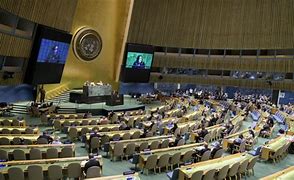The United States presented a draft resolution to the UN General Assembly on Friday, calling for a “quick end” to the conflict in Ukraine, without mentioning the country’s territorial integrity, diplomatic sources told French news agency AFP ahead of a scheduled vote on Monday.
The draft, viewed by AFP, calls for a quick end to the conflict and for lasting peace between Ukraine and Russia, a stark contrast to previous UN General Assembly texts that clearly supported Ukraine.
Russia’s UN Ambassador Vassili Nebenzia commented that the US resolution was “a good idea,” but noted it lacked a reference to the “roots” of the conflict.
The UN General Assembly will meet on Monday to mark the third anniversary of Russia’s invasion of Ukraine. For this occasion, Ukraine and European nations have prepared a draft resolution emphasising the need to “redouble” diplomatic efforts to end the war “this year” and acknowledging initiatives from several Member States proposing their vision for a "comprehensive and lasting" peace agreement.
The text reiterates previous UN General Assembly demands for the immediate and unconditional withdrawal of Russian troops from Ukraine and the cessation of Russian attacks on Ukraine. Past votes on similar resolutions received overwhelming support, with around 140 of the 193 Member States in favour.
Monday’s meeting will be the first since Donald Trump returned to the White House. Trump criticised Ukrainian President Volodymyr Zelenskyy on Friday, deeming his presence “not important” at negotiations with Russia.
The 65-word US draft resolution, proposed on Friday, is likely to anger Europeans, already disconcerted by the US-Russia dialogue on Ukraine.
“No comment for now,” said French UN Ambassador Nicolas de Rivière when asked for a reaction.
A minimalist text like the US draft that does not condemn Russian aggression or explicitly reference Ukraine’s territorial integrity seems like a betrayal of Kyiv, a blow against the EU, and a disregard for the principles at the heart of international law, Richard Gowan of the International Crisis Group told AFP.

